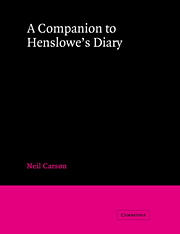Summary
AWE HAVE SEEN, Henslowe's diary entries were made for very limited purposes, and attempts to arrive at deductions of a sweeping kind necessitate a certain amount of correlation and inference. Nowhere is the process of analysis more delicate than when applied to questions of theatrical management. For on many important matters, such as the division of administrative authority, the methods of making and enforcing decisions, or the procedures by which a script was transferred to the stage, the diary is ambiguous or silent. The most crucial question to be considered in this context is the nature of the relationship between Henslowe and the various companies performing in his theatres. Was the landlord, as some commentators assume, involved in the day-to-day business of the theatre, hiring actors, buying plays, choosing costumes and properties? Or was he simply a property-owner, whose major interest was in collecting rent? Many of the prevailing negative assumptions about Henslowe's tyranny over the players have been derived from documents linked to the Lady Elizabeth's Men, c. 1613–15. The first of these, entitled ‘Articles of agreement’, sets out the responsibilities of Henslowe and Jacob Meade who had ‘raised’ the Company, on the one hand, and Nathan Field and his fellow players on the other (Mun. 52). According to its terms, Henslowe and Meade were to provide playing premises, and to supply the actors with costumes and properties (both in London and on tour) from Henslowe's private stock.
- Type
- Chapter
- Information
- A Companion to Henslowe's Diary , pp. 31 - 53Publisher: Cambridge University PressPrint publication year: 1988



